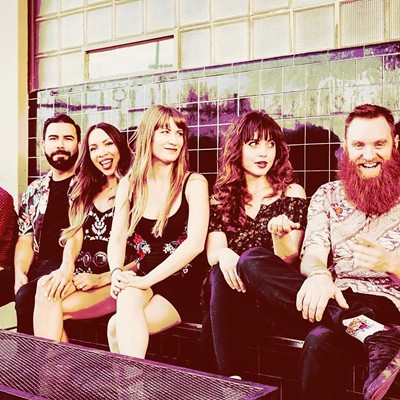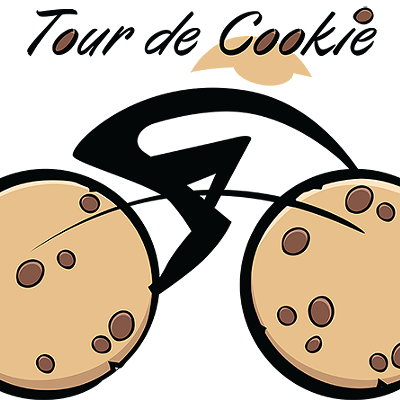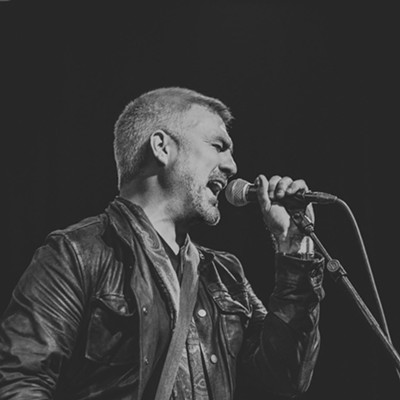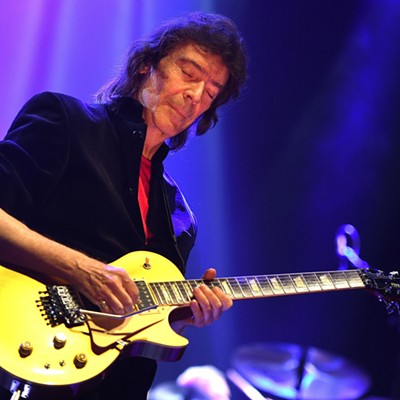Nonetheless, his raucous band Old Crow Medicine Show is a favorite among diverse groups of music fans--from traditional folkies to indie-rockers, from old-school punkers to the gentrified listeners of Prairie Home Companion. Much like his musical heroes of the 1920s, Secor and his bandmates weave their way through different social orders, equally at home in a piss-stained downtown dive bar and an outdoor festival overflowing with wine-sipping yuppies.
"I like this idea of music providing a body of evidence that confirms an older and truer form of manner and behavior," he says, speaking to the notion of authenticity in music. "The old social order of the past has been pushed aside for the social order of the self. There was a role for musicians provided by the audience that just isn't around today."
Indeed, there's a lot that isn't around today, including the kind of boisterous old-time string band music that Secor and Co. produce. Old Crow Medicine Show's most recent album, 2006's Big Iron World, offers some of the ancient alchemy that once defined much of the nation's vast musical catalog: bluegrass, gospel, blues, country, zydeco. These elements provide the core of OCMS, which is, when you boil it all down, a metallic and towering musical structure of its own. For the last 15 months, the band toured the country before plunking down in a California studio to work on a third album. These guys have played everywhere but the deep Southwest areas of Phoenix, Tucson and Las Vegas, making these few dates the end of a kind of line.
"We can hear the steady squeal of brakes," says Secor. "We're slowing down now with the great big Western sky before us, and we're excited to perform."
The band plays everything from startling originals like the Vietnam narrative of "Big Time in the Jungle" to traditional fiddle-and-banjo tunes like "Tear It Down" to rewritten Bob Dylan fragments like "Wagon Wheel" (which takes its chorus from a song written for the film Pat Garrett and Billy the Kid). Which isn't to say that Secor doesn't watch what's happening in music today. Sure, he has a CD player, but don't ask him if he needs an iPod--he'd prefer a Victrola for Christmas, actually.
"Whatever it is, music has a way of making a mark on people," Secor insists. "And there's music for every man, woman and child. I like the music that leaves a mark all the way through your body. Some people have found a way to do it via iTunes, but I do what I do because I carry music around in my heart. I'm not responsible for it, and it's not mine. We have a different kind of relationship with our audience. It's a lot of fun to love a band that loves what it does and isn't afraid to show you that love."
OCMS' love of traditional music is expressed in its wide-ranging choice of material and the band members' own impeccable songwriting.
"There's still stuff I'm saving for a rainy day," Secor reveals of his own songwriting process. "If we decided not to play a song we've written, it will probably come up in the house mix. That's when you'll hear many songs that were somehow deemed unfit."
OCMS collectively draw heavily from the influence of the greatest songwriters in the history of American music. In other words, OCMS keeps good company with people like Woody Guthrie, Leadbelly, Bob Dylan, Neil Young and a whole lot of older performers who you've never heard of, yet remain idols to Secor.
"Some of the music of the '20s contains the most excitement," he observes. "It's just really rocking and mysterious. These ideas that are so heavy in indie-rock today were around for black musicians and hillbillies in yesterday's music. It used to be the blues didn't distinguish between color, or black and white. It was just powerful music."
When you see OCMS play live, you'll notice the band's diverse audience; the music appeals to many different generations and different crowds. You'll find yourself asking, "Why are there no more lush harmonies involving male voices on the radio anymore?"
"Today's country-music voices sound digitized for the new era--you know, to fit in with the other appliances," says Secor. "You'll hear us and remember that the biggest record 30 years ago was by Crosby, Stills and Nash. Today, everything is in the way of a band that sounds like CS&N. Look at black music, too: It's only about playing to the masses now, which is the most important thing going in American music. To see a popular art form reduced to what it is now is sad. It's not nearly as exciting as it once was."
Of course, today's pop music will still be around 30 years from now, if only to sell cars, bras and aftershave.
"A song is very valuable," Secor suggests. "It doesn't have to be good--that's how important it is. Anything any of today's artists have done is a pale shadow of what was done better by others who have come before. Pop culture continues to distort everything. Elvis was maybe the only one who arrived at a time when an audience was ready for something different. Now, music is something you point and click at on the computer."
Living in the South has been good for a Northerner like Secor. The South is where a lot of his band's music comes from and, as he notes, it's good to be in a place that reminds you of what inspired so much of the old-time music.
"To experience that makes it easier to perform songs about the downtrodden and people who rely on the weather to feed their animals," he says. "It's good to be in a place that reminds you of why you play."










